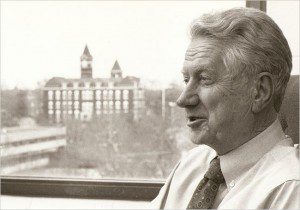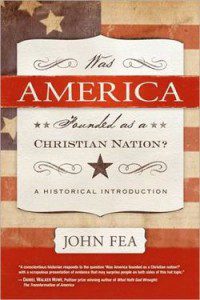
I learned this week that my former professor and mentor, Edwin Gaustad, passed away near the end of March. (Here is the obit from the New York Times and another from the Washington Post.) I was lucky enough to study with him during the one year he was a visiting professor at Princeton Theological Seminary, and it was his course in American religious history that got me thoroughly hooked on the subject. Before that time, my overriding interest had been in biblical studies.
Professor Gaustad wasn’t flashy. He usually lectured sitting down, offering substantive thoughts on history along with a wry sense of humor. He encouraged us students to dig deeply into primary source material, which I hadn’t done before. One day I ran into him and his wife outside of Firestone Library at Princeton University, and his eyes lit up with a kid-in-a-candy-store sensibility as he described to me some of the historical treasures within. He was the one who helped me to see the depths of the library’s collection in Mormon studies — at that time the largest holdings on Mormonism of any library outside of Utah. This discovery was a boon for me and fueled my future research interests — including several papers for his classes and, years later, my dissertation on the anti-polygamy movement.
Because I hadn’t studied American religious history before I met Professor Gaustad, I had no idea how famous he was, and he did nothing to alert me or other students to his own importance. He was one of the kindest professors I had ever had, taking an interest in my personal journey as well as my work. The semester I had my first class with him was when I was preparing for my wedding, and he was unfailingly, sweetly avuncular in his solicitations about Phil’s and my plans.
I have read with interest some other people’s reminiscences about Professor Gaustad, including one of his editors at Eerdmans and fellow historian Martin Marty and. Marty said:
“Edwin Scott Gaustad has been for decades the premier historian of religious dissent in the United States, a scholar who set his biographical subjects–Roger Williams, Benjamin Franklin, and others–into the context of the larger story well told in his pace-setting Religious History of America. He was also the atlas maker for two generations of Americans who wanted to fuse geographical and historical interests, as he himself did so well.”
Over the last twenty years (!), he and I corresponded occasionally and I saw him at a few professional conferences, the last time being an AAR meeting several years ago. I’m glad we kept in touch and I will miss him as a mentor, scholar, and friend.

